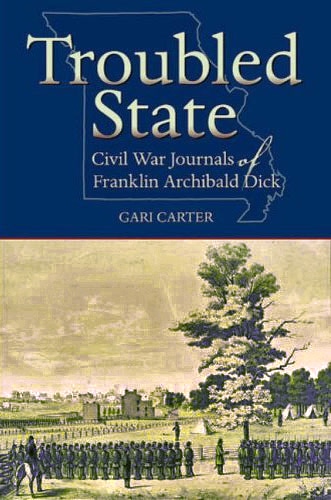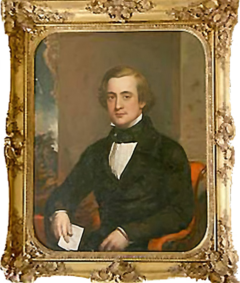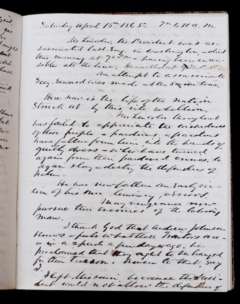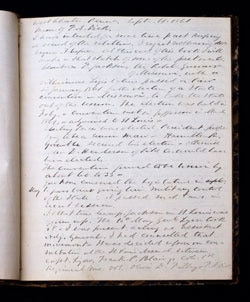Troubled State: Civil War Journals of Franklin Archibald Dick is the Civil War journals of Franklin Archibald Dick, a prominent St. Louis attorney, who acted as an adviser for Lincoln, Grant, Lyon, Blair, and other important political figures at that time. From an insider’s point of view, he described the Civil War as a loyal Unionist in the politically torn city of St. Louis. More importantly, Franklin Dick’s Civil War journals uncover first hand accounts of historically pivotal moments during the war, such as the Camp Jackson incident, where he acted as Captain Nathaniel Lyon’s Assistant Adjutant General. Franklin Dick’s Civil War journals also add great details to the known literature on the Civil War in Missouri, a barely pro-Union border state during those turbulent years. Brother-in-law to Frank Blair, Franklin Dick served as Missouri Provost Marshal General under Major General Samuel Curtis in 1862. After the war, he practiced law in Washington with Montgomery Blair, Lincoln’s Postmaster General.
These Civil War journals contain my great-great-grandfather’s outspoken views on the Civil War, the country, the state of Missouri, leaders he knew, politics, daily life, concerns about morality, inner thoughts, and private worries. His entries changed from early optimism to later doubts about his future due to pressures from his loyalty to the Union and war issues. He felt he was a tree in a movable vessel and feared returning to the turmoil in St. Louis, as he mourned the loss of his years of work in Missouri. Franklin Dick’s unique record of American life during the Civil War reminds us that we are what we were, and gives us an irreplaceable new perspective on the impact of history in our lives.


Book Information
314 pages, 10 b&w images, index & bibliography
Paperback ISBN: 9781734260144
Ebook ISBN: 9781734260151
Available through Amazon, IngramSpark and all major distributors.

Photo credit: R. L. Geyer


Photo Credit: R. L. Geyer
Press and Reviews
The Sarasota Herald-Tribune
Finding connection: Letters and digital records reconnect people to their roots and others by Emily Leinfuss Special to the Herald-Tribune | USA TODAY NETWORK (excerpt)
Civil War diaries
When it comes to the Civil War, Gari Carter has more than one story to tell. “Both my maternal ancestors fought for the Union, Franklin Dick in St. Louis, and Colonel William James Leonard from Maryland to Virginia,” said the Sarasota author.
Carter wrote about the former in her 2008 book “Troubled State: The Civil War Journals of Franklin Archibald Dick.” Her book about Colonel Leonard, “The Bone Ring,” will be published this year. It was named for a family heirloom: the ring that Col. Leonard’s men carved him for his birthday from the leftover bones of their food, said Carter.
Despite having diaries from both men, each book took years of investigation. “There is personal satisfaction in pulling together all the research about Franklin Dick and Colonel Leonard,” said Carter. A highlight along the way was a “visit to my 99-year-old cousin who had the bone ring and hearing his memories,” she said.
“It feels as if I am honoring my ancestors in ways that would have made them happy,” she added.
Carter admits that Internet resources are increasingly helpful when investigating family history. But there’s nothing like being able to see and touch original documents and photographs. That’s also the opinion of Phaedra Dolan, director of Historical Records for the Manatee Clerk. Her department operates two historical villages, two museums and extensive records archives that are housed in Bradenton’s historic Carnegie Library.
“There’s something special about being able to see those old cursive handwritten documents,” said Dolan. “It’s not the same as looking at a scanned image,” she added. You can see little errors or when someone couldn’t sign their name and only made a mark. Those things, together with knowing that the person from the past was also once in front of the document, “creates a real connection between then and now,” she said.
By Midwest Book Review (Oregon, WI USA)
June 9, 2008
Troubled State: Civil War Journals of Franklin Archibald Dick is a collection of private journals written by Franklin Archibald Dick, a St. Louis attorney, Union officer, and provost marshal general. Assiduously assembled by Franklin Dick’s great-great-granddaughter Gari Carter, Troubled State offers a firsthand view of historical events such as the early Camp Jackson incident (during which he was Captain Lyon’s assistant adjutant general). Dick was concerned about the slow progression and horrendous cost of the civil war; witnessing the divided city of St. Louis broke his heart, and journals reflect his progression from optimism to grave doubts about the future. Thoughtfully annotated and supplemented with brief biographies as well as a family genealogy and bibliography, Troubled State is a welcome addition to Civil War primary source shelves.
Black Mountain News
Rapid River – Month of May
Radio Interviews
Radio Interview On KWMU.org
2008 – St. Louis and the Civil War – A discussion about the role of St. Louis in Civil War history.
Radio Interview on KSMU.org
2008 – Author Gari Carter is coming to Springfield to promote her new book about Missouri and the Civil War. KSMU’s Kristian Kriner reports.
Quotes and Comments
David Goldfield, Professor of History, University of North Carolina, Charlotte
“A benefit to scholars and buffs alike, the journals of Franklin Dick offer readers a different perspective on the Civil War from the contested and bloody battleground that was Missouri. The diaries provide valuable insights on how Unionists reacted to the shifting fortunes of war in Missouri and in St. Louis in particular, and how the life of a St. Louis attorney-turned-provost-marshal changed for all time. The editing is helpful without being obtrusive, allowing Dick’s personality to come through.”

Comments On Talks
Comment from Rev. Maurice Smith, President, Highland Park Civil War Round Table, June 26, 2008
“I and a number of others in our CWRT really enjoyed your presentation. Of course it was of special interest because it involved a local personality in St. Louis during this important time in American history. I really appreciate the time and effort you put into your research. It shows a passion in your subject matter. I would recommend your program to any other CWRT group. If there’s anything else I can do for you, please let me know.
Blessings, Mauri Smith”

Comments from Curt Wittbracht, past President, St. Louis Civil War Round Table, January 23, 2008
Gari Carter’s presentation on her new book “Franklin Dick’s Civil War Journal’s” was very well received at the St. Louis Civil War Roundtabl
She brought us back to the time, just before the start of civil war hostilities, when Southern sympathizers threatened to take over the City of St. Louis and loyal citizens were forced to protect the Union anyway they could. Her ancestor, Franklin Dick, was a central figure in these events working with Nathaniel Lyon and the Blair brothers, Franklin and Montgomery, as they secretly worked to save the city from the Confederate leaning State Militia.
It was most fascinating to learn how Nathaniel Lyon, borrowing Franklin’s mother-in-law’s dress, was able to scout out Camp Jackson and later return to overwhelm the camp and arrest the “secesh” thereby saving the City of St. Louis for the Union. Franklin Dick served with Nathaniel Lyon until his death and corresponded with Lincoln on affairs in Missouri during the War. Her story of Franklin Dick and his time in pre-civil war St. Louis is most interesting and is very well presented.

Comments from Bruce Patterson, Cape Fear Civil War Round Table, October 9, 2008
I spent some few minutes yesterday reviewing your book which I again found to be very professional. As I mentioned during dinner, the layout, photographs and graphics are extremely well done. You bring his journal to life. I’m sure that Franklin Archibald Dick would be very proud of his great-great granddaughter and the professional manner in which she published his important journals. Thank you for sharing it with us.
Respectfully,
Bruce Patterson
bppatterson@earthlink.net
Cape Fear Civil War Round Table

Comments from Mary Barnt, President, Peace River Civil War Roundtable, November 14, 2008
Gari Carter gave a very knowledgeable and interesting presentation. The close connection she had with her great-great-grandfather made the story come alive.